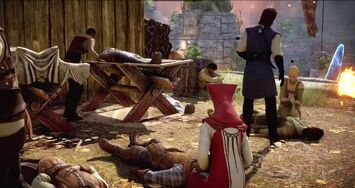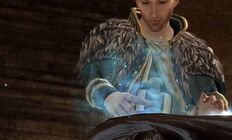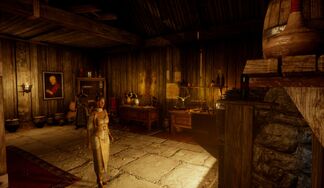
Mother Giselle attending to refugees in The Hinterlands
Medicine in Thedas plays a key role in the quality of life of its inhabitants, and is vital in a land so torn by conflict. The magical and the mundane both play a role in the healing and management of diseases and injuries. Common people can access care through the Chantry, or one of the Circles of Magi. Local chantries provide care for the sick, and members of the clergy may travel to troubled areas in order to provide free relief in the name of charity. There are also independent herbalists, apostates[1] and midwives[2][3] who practice the healing arts and provide their services to the common folk.
With such limited means of care, people of Thedas therefore learn to make do with the healing fauna and flora that they can find around them.
Treatment[]
Mundane[]

The interior of Skyhold's hospital, should the Inquisitor choose to build it
Some Thedosian medical practitioners of the day believe in Humorism.[4] Essentially, this theory holds that the mortal body is filled with four basic substances, called humors, which are in balance when a person is healthy. All diseases and disabilities supposedly result from an excess or deficit of one of these four humors. These deficits were thought to be caused by vapors inhaled or absorbed by the body. The four humors are black bile, yellow bile, phlegm, and blood. Treatments from this school of thought are bloodletting and the application of leeches. The bile of Gurgut is thought to balance the humors. The Qunari employ breathing exercises to "clear the stale humors".[5] Those practicing medicine are also aware of and perform the amputation of limbs.[4]
Superstition also plays a large part in Thedosian's attitudes towards healing, such as how the removal of a wart requires rubbing the half of a potato on it and feeding the potato to a snoufleur, which should take the wart upon itself. Another example of this is in a treatment meant for improving virility, after drinking a tonic from tusket horn the patient is supposed to place the remnants under their pillow.[6] Another superstition to prevent a mage child includes avoiding conceiving in winter, sleeping with dried embrium under one's pillow during pregnancy to ensure good health, and even placing leeches on a child's limbs or drowning them to the brink of death to prevent the manifestation of magic.[7] However, some are critical of these non-magical methods, such as Lirene, who comments on her distrust of purveyors of "hensbane and leeches".[8]
Magical[]

Anders using magic to heal a refugee
Mages within the Circle of Magi may choose to specialize in the Creation school of magic. When using Creation magic, a healer is manipulating natural forces to imbue the recipient with restorative energy that is capable of knitting flesh and mending bone. The caster of a Creation spell can also infuse their recipient with beneficial energy that greatly accelerates healing.[9] However, this power is limited and cannot fully heal serious injuries.[10] Some mages are able to heighten their healing powers beyond the limitations of normal magic by becoming Spirit healers, by casting restoration spells and using the life energy acquired from channeling benevolent spirits of the Fade. With the help of spirits,[11] It is important to note that magic cannot be used to regrow missing limbs or raise the dead.[12]
Combinations of herbs made into potions, especially elfroot, are also used. Mages within the Circle of Magi study alchemy to invent new potions and improve upon ones that already exist. It is unclear whether one needs to be a mage to brew potions or not.
A holy artifact to Andrastians is The Urn of Sacred Ashes. The Urn is believed to contain Andraste's ashes which have healing properties strong enough to bring someone back from the brink of death.
Medicinal substances[]
Many substances of varying effectiveness are used in creating remedies. They're usually derived from plants, animals, and minerals.
- Andraste's Mantle – together with Drakevein and Winterberry makes an antidote to wyvern's venom[13]
- Crystal Grace – is said to have medicinal value,[14] though its specific properties are unknown
- Elfroot – primary ingredient of healing salves,[15] as well as a remedy for minor ailments such as indigestion, flatulence, and hoarse throat[16]
- Embrium – fragrance of the Salubrious Embrium variety eases a person's breathing[17]
- Foxmint – used in alleviating gut troubles[6]
- Prophet's Laurel – has purifying qualities and is used in crafting poultices and tinctures[18]
- Spindleweed – helps with afflictions of the lungs[6] and fever[19]
- Witherstalk – when the plant is fresh, it can serve as a contraceptive[20]
Diseases and illnesses[]
- Ague – fever and shivering[21]
- Asala-taar – "soul sickness;" a Qunari combat ailment that seems analogous to a combat stress reaction, or even post-traumatic stress disorder; it is an epidemic in Seheron, where statistically two soldiers contract it for every one casualty; sufferers are usually removed from combat and reassigned among the priesthood and workers[22]
- Bellows cough[23]
- Black-lung[24]
- Blight sickness – also known as "a wasting illness";[25] contracted through contact with darkspawn, and progresses to the person becoming a Ghoul, though this time varies for everyone; some people die immediately upon contact with the Taint and some, such as Leliana, are naturally resistant[26] The more contagious form of this disease is often referred to as "a plague"[27] and can be spread by Blight-touched rats[28] it is also known to wipe out entire species of animals[29]
- Bone-sickness[30]
- Cancer[31][32]
- Cholera – also known as "blue death"[33][34][35][36]
- Common cold[37]
- Dementia[38][39]
- Falling sickness – an archaic term for epilepsy[40]
- Frost-cough[41]
- Gout[3]
- Hundred Days Cough – an outbreak of this disease in 8:77 Blessed killed the twin sons of Emperor Judicael II of Orlais as well as his niece[42]
- Hunger shivers[43]
- Lyrium withdrawal[38][44][45]
- Miser's madness – lead poisoning caused by practicing the "travelers' bend", or hiding bent coins underneath the tongue or against the palate, with Hunter Fell currency struck from lead[46]
- Pox – presumably a sexually-transmitted infection[47]
- Plague – the first symptom of one plague is coughing and paleness, with fever following the next day[48] doors of the afflicted are marked with a yellow symbol[49]
- Rossalia – also known as scarlet fever[50][51]
- Scurvy[52][53][54]
- Seasickness[55][56][57]
- Sexual dysfunction[58]
- Syphilis – colloquially known as deceiving-pox or the prince-in-green[59]
- Wasting disease[60][61] or Wasting illness,[25][62][63] also known as the wasting[64]
- Water sickness – a disease that may affect wolves (and other animals, presumably), prompting the Dalish to shoot down the affected specimens on sight[65]
Trivia[]
- Pickled eggs are thought of as a sort of cure-all by the people of Ferelden.[21]
- To cure a cold, a folk remedy says to boil whiskey, juice half a lemon, and used peeled and crushed garlic. Supposedly Grey Wardens swear by this method.[6]
- Books on medicine and diseases include Olianna's Physick and Polyosteres' Calamities of the Flesh.[66]


